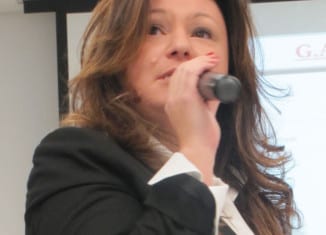Three Village teaches literacy through literature

A common theme regularly voiced by Three Village educators is the desire to produce “lifelong learners,” and its emphasis was underscored by English language arts educators during a recent school board meeting.
While the “Literature to Literacy” presentation by the district’s secondary level English chairs outlined changes to the English curriculum in the continued alignment to Common Core Learning Standards, Ward Melville High School English chair Brian McAuliffe noted that some are not new to Three Village.
Developing student vocabulary, along with an emphasis on close readings and critical thinking, are skills that are being developed in all disciplines, particularly in social studies and science, he said.
“In effect, we are all literacy teachers,” McAuliffe said.
He told the school board that students will be reading a balanced amount of fiction and nonfiction across the entire academic curriculum, adding that teachers “are very loathe to give up their beloved literature, and they don’t have to.”
The difference is that units will no longer be defined by one text — rather they will focus more on “intertextuality.” That means students will work with a central or “fulcrum text,” such as a novel, that will be supplemented by “texture” texts like poetry and nonfiction reading.
Those who attended the board meeting also heard that there would be an emphasis on close readings and the use of evidence from texts to support assertions and analysis. Students will also learn to analyze and write arguments, as well as deconstruct texts using literary and rhetorical devices, develop oral communication skills and be taught proper grammar and punctuation.
The emphasis on written skills is supported by the Lucy Calkins Units of Study for Writing from kindergarten to the eighth grade. Cathy Duffy, chair of English at R.C. Murphy Junior High, said this is the second year that the seventh and eighth grades are using the program. Students will have opportunities to practice writing, receive feedback and do revisions so that, at the end of the school year, they will have a portfolio of their three major writing projects. The portfolio will be passed on to the next teacher, who will use it to assess where the student’s writing focus should be for the coming year, Duffy explained.
In addition to final exams and the ELA state assessments, seventh and eighth graders will take a Scholastic Reading Inventory (SRI) assessment. It is a computer-based test that allows teachers to monitor students’ reading comprehension and select appropriate reading material.
Joanna Cadolino, English chair at P.J. Gelinas Junior High School, added that for ninth graders, the curriculum would continue to move away from memorization and toward more critical thinking. Additionally, ninth graders will explore speech writing, public speaking and research writing, which will require the evaluation and synthesis of source material at the honors level.
McAuliffe said that this year’s junior class would be the first to take the new English Regents exam. Changes include longer, more complex texts, as well as a section in which students will have to take a position on an argument and support it with evidence from provided texts.
Though he noted “a great deal of uncertainty” about the new exam, he said he was optimistic.
“We’re not working in isolation,” he said, adding that students have had good preparation from the previous grades.
The increased rigor of Regents-level courses will mean that Ward Melville will no longer offer an 11th grade Honors ELA class.
Students can take either a Regents-level course, or AP English Language and Composition.
The high school will also offer new electives, including news literacy, poetry of hip hop and sports literature.






